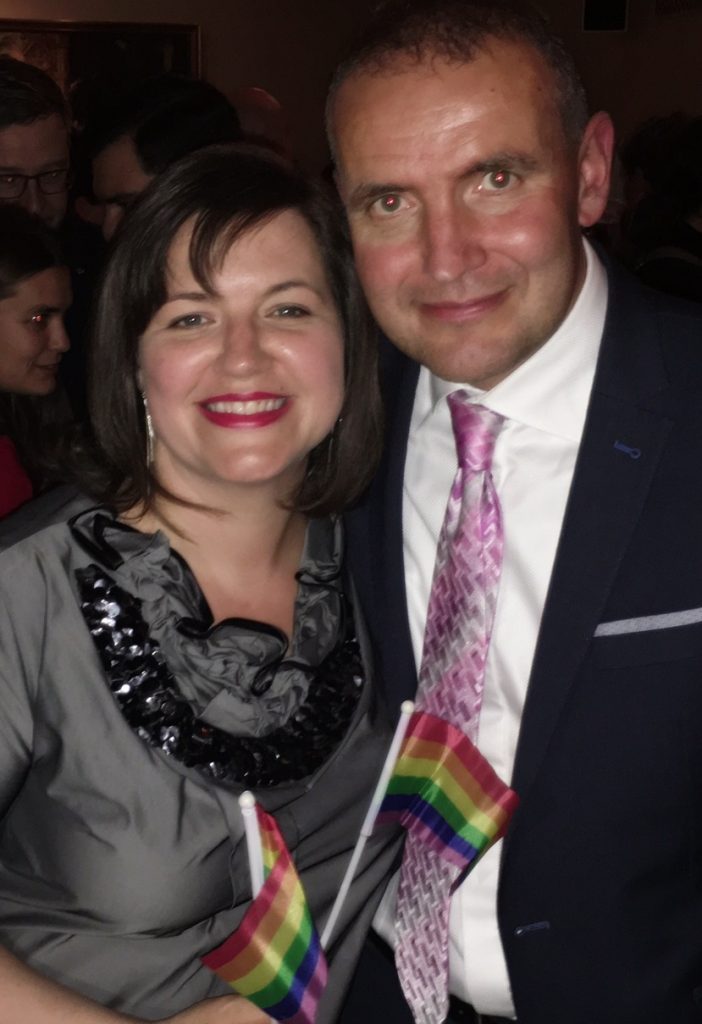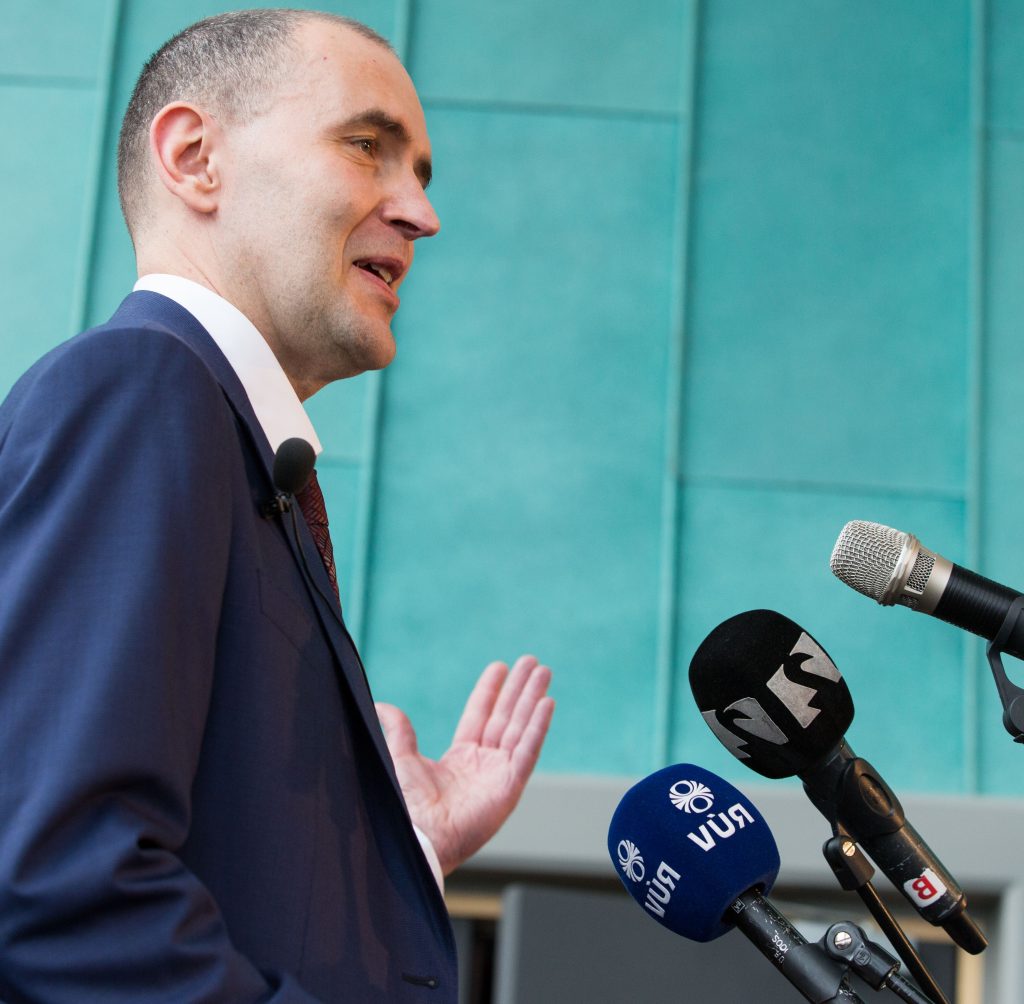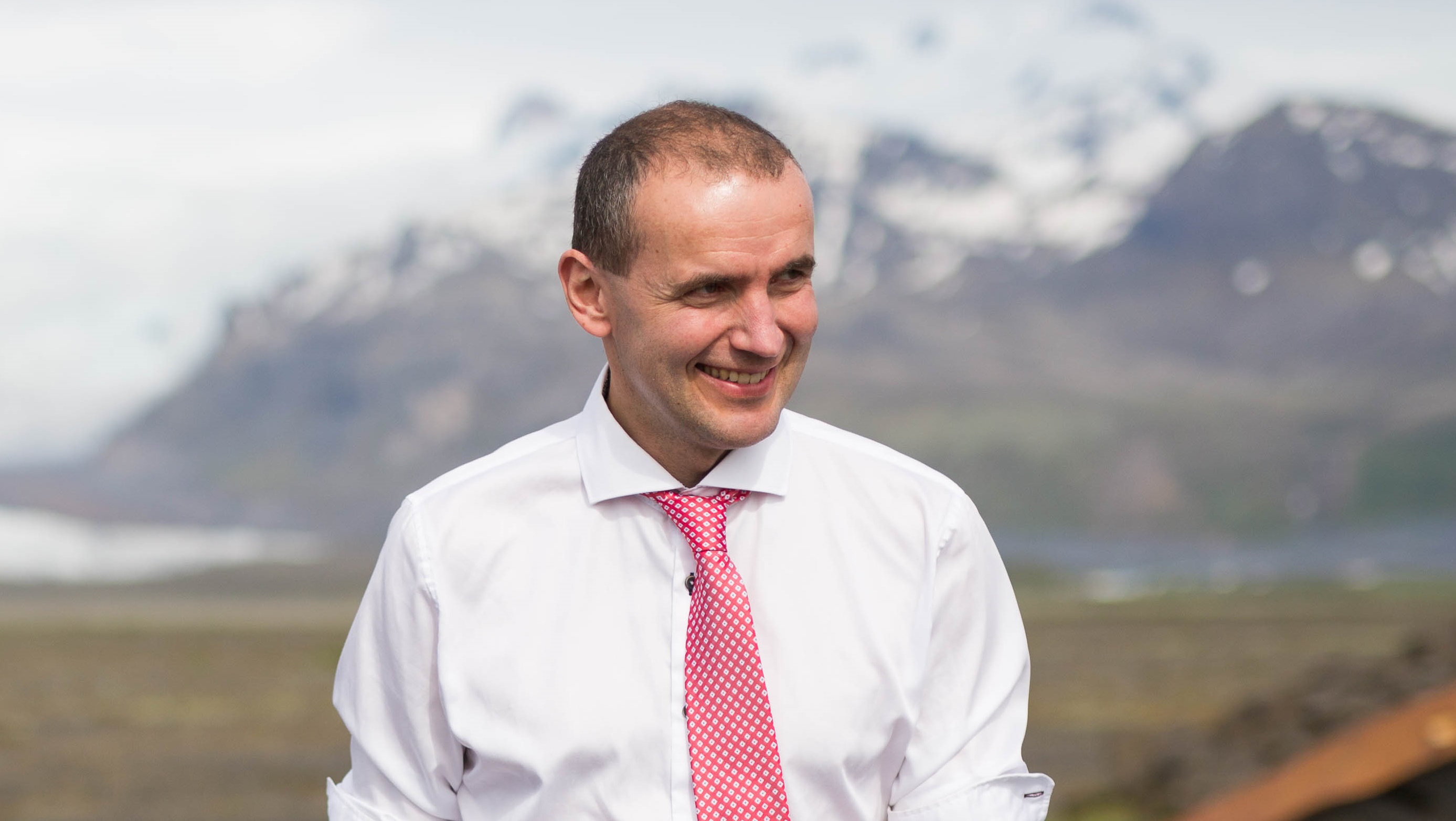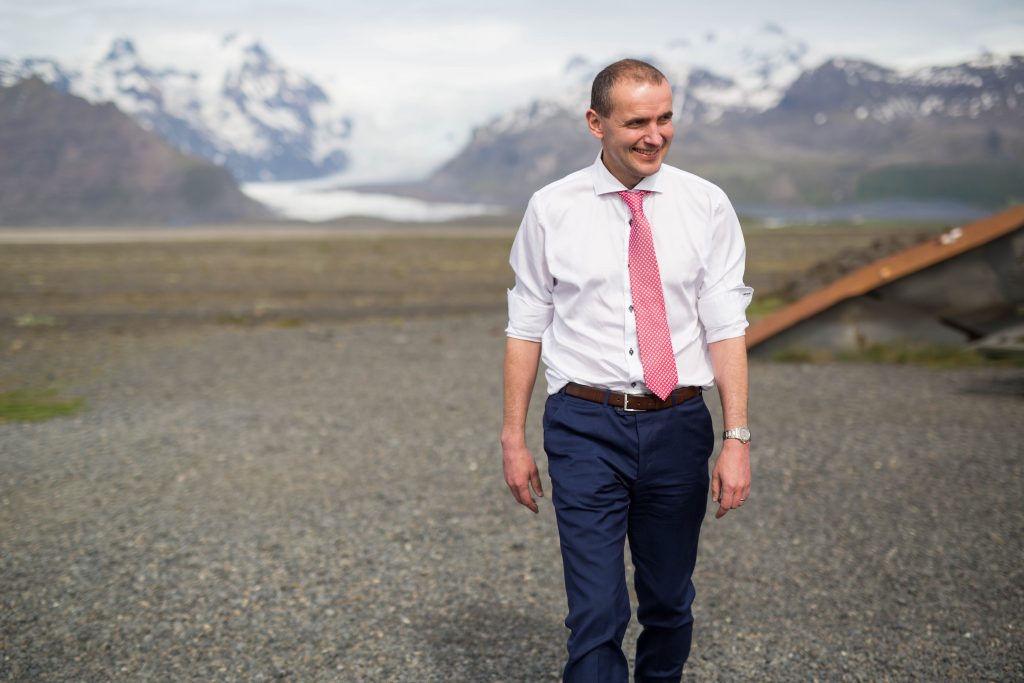When the National Queer Organization, Samtökin ´78, celebrated their 40th anniversary in June, it was announced that the President of Iceland, Guðni Th. Jóhannesson, had become patron of the organization. Here he speaks in depth with GayIceland about being called “faggot” as a boy and why he celebrates diversity at the Reykjavik Pride festival every year.

Reykjavik Pride festival is being held this week, will you be participating? “Yes, I will be attending the opening ceremony in Háskólabíó on the 9th of August. I don’t know about other events, but I do know that unfortunately I will be unable to take part in the Pride Parade itself, I will not be in the Reykjavík region then.”
Guðni (because in Iceland people are always on first name basis, even with the president), I spoke to you two years ago when one of the first gestures you made as President of Iceland was to become the first head of state in the world to officially participate in a Pride festival. Now you’ve become patron of Samtökin ´78, surely this cause is close to your heart? “Well, for me it was a very natural and joyous decision to accept the offer to take part in the parade two years ago. I support human rights, I support diversity, I support freedom of expression, freedom of love, freedom of religion and freedom of having no religion at all. All freedom carries with it responsibility. Freedom of expression does not mean that you’re allowed to spew hatred and certainly not when it’s directed towards groups of people who have had to suffer in the past, like the queer community. So, with that in mind I enjoyed taking part in the parade. Also I had observed the parade before in my pre-presidential life and there was no way I was going to stop being present just because I had a new role.
“I feel that being patron is not an empty gesture. I feel that it creates an obligation on my part to speak out when appropriate.”
Now, becoming a patron of Samtökin ´78, I did not have to think too much about it. It should be mentioned that I’m a patron of a number of organisations, including the Red Cross, the Scouts, the ICE-SAR, The Icelandic Youth Association. So, it’s not a unique occurrence that I’m their patron but like I said, by being a patron of Samtökin ´78 I hope to emphasise the importance of human rights, human dignity and diversity in our society.”
Not an Empty Gesture
Did you have to think about it when they asked you? And what’s the response been for you? “They approached me and I gave it some consideration of course, it’s only natural that you take all matters into due consideration. But frankly, the very little negative response I have noticed – of course there might be something out there that I am not aware of – has either been on the one side from some people who believe that being gay is against the laws of their god or the laws of nature or on the other side from people within the queer community who feel that Samtökin ´78 have strayed from their original objective. But these are minor pieces in the big, positive puzzle. I’ve not heard so much negativity about this.”

What does being a patron of such an organisation entail? Do you now have to focus more on queer matters as president? “I have no formal obligations as a patron, whether it’s as patron of the Red Cross or Samtökin ´78; it’s more a demonstration of the fact that you support the cause of the organisation in question. Therefore, you need to follow what’s happening and judging by my brief stay in this position, I already know from being patron of other organisations, that you’re mostly politely asked to attend bigger events and I’ll only be pleased to do that if my busy schedule allows.”
Will you be more vocal when debates about queer matters arise in society now? “Yes and no. I wouldn’t want to feel obligated to make my voice heard whenever matters relating to the queer community are being discussed in society but yes, I feel that being patron is not an empty gesture. I feel that it creates an obligation on my part to speak out when appropriate.”
Freedom of Love
Samtökin ´78 are celebrating their 40th anniversary this year and you yourself turned 50 recently so you were a young boy when the queer community began making waves in Iceland. Do you remember when you first learnt about the organisation or became aware of queerness in your environment? “Honestly, no. I remember the late Guðni Baldursson being the first chair of Samtökin ´78 and one of the things I can recall from my childhood is being teased and called “Guðni hommi, Guðni hommi” (e. faggot) just because we shared the same name. Now, whether you take some Freudian approach to this and conclude that this is the reason I now want to support the queer community, I would not go with you down that road. It’s just an anecdote that comes to mind now that you’re asking me this. But I can’t really remember more than this, it probably felt the same as being called “Guðni idiot” or whatever. You know, this was at a time when calling someone “bloody faggot” was not unheard of, it was just part of that era. But in my upbringing, there was nobody in my close environment who was openly gay, and I honestly can’t recall any words of wisdom, but certainly not prejudice either, from my parents. I was actually brought up a Catholic but that was never a big factor in my life. I would say that I was, hopefully, with an average knowledge of the world. I will not boast but I can certainly say I never felt prejudice or fear or anything like that towards gay people. But again, having said that, they weren’t in my proximity, to my knowledge.
So, would you say that it wasn’t until your adult life that you fully understood that queerness is just part of human nature? “Yes, I would certainly say so and in my adult life I gained gay friends, but I just know them as “friends”, I don’t define them in any way by their sexual orientation. I was never campaigning openly for queer rights before I became president but once you’re in this position you realise the burden of responsibility on your shoulders and you realise the potential you have, to speak out and be proactive. And it’s a difficult position in which to be, you cannot save the world, you sometimes have to do things that are not pleasing to yourself or to all. But when it comes to queer rights and the queer community, like I have said before, I just believe in freedom of love and diversity in society. And in general the queer community in Iceland conducts its campaign and outlook in a way that I like and support.”
Your older daughter, Rut, must have had some influence on you, as she identifies as queer, does she not? “Right. She’s fine with having that mentioned here but she told me she wouldn’t feel comfortable about me talking about her private life and I of course respect her wishes. But I’ll say this: I have learned a lot from Rut, I admire her and am extremely proud of her. And that’s that.”
The Usefulness of Dialog
Iceland is often hailed as a country without queer prejudice, somewhat a haven for queer people. Do you think that’s correct or that there’s still some stigma around being queer in Icelandic society? “I think it’s still a considerable step to take to come out of the closet. I think it’s still emotionally weighty, as it were, for a boy or a girl to go to their parents and say “Mum, dad, I’m gay” – it’s a big step for them still. And in society in general, I know for a fact that queer people still suffer prejudice. But you have to see it in the light that we have moved on, society is certainly moving in the right direction. Decades ago, what were Samtökin campaigning for? Well, simply the right to be acknowledged as individuals and make free choices and the right to live in peace with themselves and society without harming anyone. We have more diversity within the queer community now, e.g. trans people and intersex and that diversity brings new challenges.
Also, I think it’s a constant struggle in society to maintain your human rights and that goes for the queer community as well as others. So, therefore the basic elements are there, to protect individual rights and diversity. Freedom of love is an expression I really like and as we move on, developments in society bring new challenges and new approaches so you can never say: “All right, here, it’s over and done with.”
Do you intend to use your influence and position to address queer matters abroad too? “If the opportunity arises. As I said before, you can’t save the whole world in one go or by declarations or comments and likes on Facebook and so on. You have to think about whether your actions have any concrete affect for the better. But I will certainly not shy away from saying what I have been describing to you. I believe in the value and importance of human rights for all in society, queer or not, and the world will be a better place when that approach is universal.”
“I sincerely believe and hope that the Pride festival should be seen as a symbol of the importance of freedom, dignity and diversity in society in general.”
I’m glad you’re not going to be shy about queer matters because as we know, there are some states where there’s little to none tolerance for queer people and they’re persecuted still in some states such as Russia. Will you be able to interact with such states and will you be happy about being on friendly terms with the leaders of such states, as President of Iceland? “Well I’m not going to become a hostage to my declarations and views. It is a fact that we live in a world where states have different views and policies on many things, including queer rights and you will not change that by declarations alone. I believe in general in the usefulness of dialog and I believe that you should engage and try to influence rather than refuse to meet with certain persons outright. And this does not only apply to the queer community or the state that you mentioned in particular, it’s a general policy that I firmly believe in. Furthermore, I think here in Iceland people need to keep in mind that the president does not formulate foreign policy so when it comes to the state of Iceland making its voice heard on the international stage then that is not the role of the president.”
Reykjavik Pride has begun and is always a massive celebration attracting crowds and a lot of attention. What significance does it have to you? “I remember before I became president, when I watched the parade with my family, with Eliza and the kids, that I felt it was not only in support of the queer community. I totally understand and sympathise with the view that it is an event to demonstrate the rights and interests and challenges facing the queer community. But at the same time, I sincerely believe and hope that the Pride festival should be seen as a symbol of the importance of freedom, dignity and diversity in society in general. Because these issues are universal, they are of concern to the queer community and the rest of society, so we are in this business together. Queer people, non-queer people, whichever terms you use. And maybe I should also add that as a patron, I want to help rather than offend so forgive me if I don’t use the right phrases or words. Sometimes you do so inadvertently – I’ve done so when I want to help the good cause of people with disabilities, for instance. You inadvertently use a word that is either inappropriate or outdated and all I want to say here – and I sincerely hope I won’t offend anyone – is that respect and tolerance works in the other direction too, as long as there’s no malice. Please don’t get too easily offended, if you know what I mean.”
Main photo: Håkon Broder Lund



